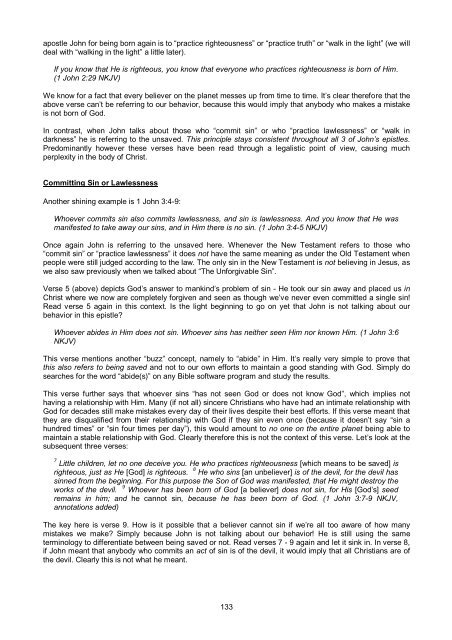Grace, the Forbidden Gospel - Online Christian Library
Grace, the Forbidden Gospel - Online Christian Library
Grace, the Forbidden Gospel - Online Christian Library
Create successful ePaper yourself
Turn your PDF publications into a flip-book with our unique Google optimized e-Paper software.
apostle John for being born again is to “practice righteousness” or “practice truth” or “walk in <strong>the</strong> light” (we will<br />
deal with “walking in <strong>the</strong> light” a little later).<br />
If you know that He is righteous, you know that everyone who practices righteousness is born of Him.<br />
(1 John 2:29 NKJV)<br />
We know for a fact that every believer on <strong>the</strong> planet messes up from time to time. It’s clear <strong>the</strong>refore that <strong>the</strong><br />
above verse can’t be referring to our behavior, because this would imply that anybody who makes a mistake<br />
is not born of God.<br />
In contrast, when John talks about those who “commit sin” or who “practice lawlessness” or “walk in<br />
darkness” he is referring to <strong>the</strong> unsaved. This principle stays consistent throughout all 3 of John’s epistles.<br />
Predominantly however <strong>the</strong>se verses have been read through a legalistic point of view, causing much<br />
perplexity in <strong>the</strong> body of Christ.<br />
Committing Sin or Lawlessness<br />
Ano<strong>the</strong>r shining example is 1 John 3:4-9:<br />
Whoever commits sin also commits lawlessness, and sin is lawlessness. And you know that He was<br />
manifested to take away our sins, and in Him <strong>the</strong>re is no sin. (1 John 3:4-5 NKJV)<br />
Once again John is referring to <strong>the</strong> unsaved here. Whenever <strong>the</strong> New Testament refers to those who<br />
“commit sin” or “practice lawlessness” it does not have <strong>the</strong> same meaning as under <strong>the</strong> Old Testament when<br />
people were still judged according to <strong>the</strong> law. The only sin in <strong>the</strong> New Testament is not believing in Jesus, as<br />
we also saw previously when we talked about “The Unforgivable Sin”.<br />
Verse 5 (above) depicts God’s answer to mankind’s problem of sin - He took our sin away and placed us in<br />
Christ where we now are completely forgiven and seen as though we’ve never even committed a single sin!<br />
Read verse 5 again in this context. Is <strong>the</strong> light beginning to go on yet that John is not talking about our<br />
behavior in this epistle?<br />
Whoever abides in Him does not sin. Whoever sins has nei<strong>the</strong>r seen Him nor known Him. (1 John 3:6<br />
NKJV)<br />
This verse mentions ano<strong>the</strong>r “buzz” concept, namely to “abide” in Him. It’s really very simple to prove that<br />
this also refers to being saved and not to our own efforts to maintain a good standing with God. Simply do<br />
searches for <strong>the</strong> word “abide(s)” on any Bible software program and study <strong>the</strong> results.<br />
This verse fur<strong>the</strong>r says that whoever sins “has not seen God or does not know God”, which implies not<br />
having a relationship with Him. Many (if not all) sincere <strong>Christian</strong>s who have had an intimate relationship with<br />
God for decades still make mistakes every day of <strong>the</strong>ir lives despite <strong>the</strong>ir best efforts. If this verse meant that<br />
<strong>the</strong>y are disqualified from <strong>the</strong>ir relationship with God if <strong>the</strong>y sin even once (because it doesn’t say “sin a<br />
hundred times” or “sin four times per day”), this would amount to no one on <strong>the</strong> entire planet being able to<br />
maintain a stable relationship with God. Clearly <strong>the</strong>refore this is not <strong>the</strong> context of this verse. Let’s look at <strong>the</strong><br />
subsequent three verses:<br />
7 Little children, let no one deceive you. He who practices righteousness [which means to be saved] is<br />
righteous, just as He [God] is righteous. 8 He who sins [an unbeliever] is of <strong>the</strong> devil, for <strong>the</strong> devil has<br />
sinned from <strong>the</strong> beginning. For this purpose <strong>the</strong> Son of God was manifested, that He might destroy <strong>the</strong><br />
works of <strong>the</strong> devil. 9 Whoever has been born of God [a believer] does not sin, for His [God’s] seed<br />
remains in him; and he cannot sin, because he has been born of God. (1 John 3:7-9 NKJV,<br />
annotations added)<br />
The key here is verse 9. How is it possible that a believer cannot sin if we’re all too aware of how many<br />
mistakes we make? Simply because John is not talking about our behavior! He is still using <strong>the</strong> same<br />
terminology to differentiate between being saved or not. Read verses 7 - 9 again and let it sink in. In verse 8,<br />
if John meant that anybody who commits an act of sin is of <strong>the</strong> devil, it would imply that all <strong>Christian</strong>s are of<br />
<strong>the</strong> devil. Clearly this is not what he meant.<br />
133

















